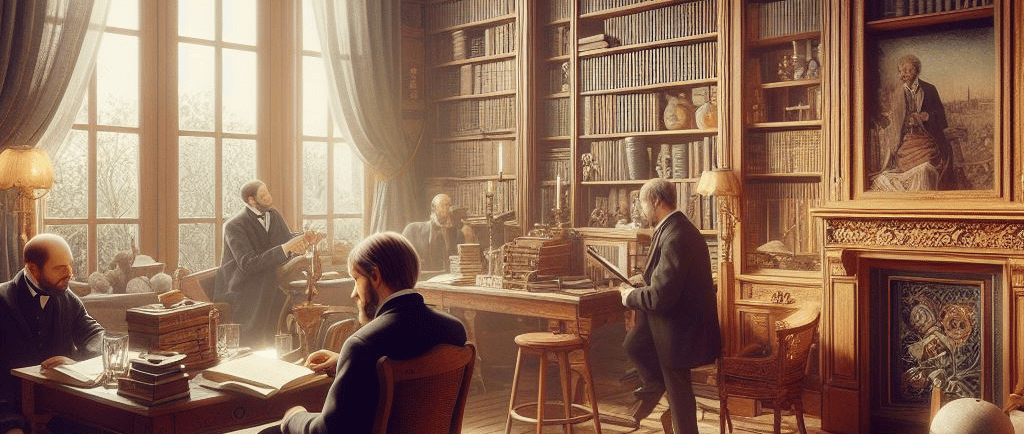
What is a Man of Letters?
RHAPSODIES
S.C. Farrow
9/26/20236 min read


Have you heard the term ‘man of letters’? It’s an old term that goes back to the 17th and 18th centuries, but what does it mean? What exactly is a man of letters?
Let’s take a deep dive into this fabulous title and find out what it means to be a man, woman, or person of letters.
The term ‘man of letters’ is not actually gender specific. While it was historically used to refer to men, it can now be used to describe anyone who meets the criteria outlined below.
A ‘man of letters’ is someone who is highly educated and knowledgeable in literature, especially a professional writer or scholar. The term is often used to describe someone who is well-versed in the classics, as well as in more contemporary works of literature.
‘Men of letters’ are typically seen as being intellectuals who are deeply committed to the pursuit of knowledge and culture. They may be writers of fiction, poetry, essays, or other forms of literature. They may also be scholars who teach or research literature, or who work in publishing or libraries.
‘Men of letters’ have played an important role in society throughout history. They have been responsible for creating and preserving many of the great works of literature that we enjoy today. They have also been influential thinkers and social commentators, using their writing to explore important issues and ideas.
BELLETRIST
Belletrist: (noun) a writer of belles-lettres
Belles-lettres (plural noun) 1: literature regarded as a fine art, especially as having a purely aesthetic function. 2: light and elegant literature, especially that which is excessively refined, characterised by aestheticism, and minor in subject, substance, or scope.
As the French term belletrist or homme de lettres suggests, ‘man of letters’ does not necessarily mean an academic. At a time when literacy was rare and thus highly valued in the upper strata of society, a man of letters was a literate man who could read and write.
Belletrists were the French literati during the 17th and 18th centuries: French citizens of the Republic of Letters, commonly referred to as ‘citizens of’ the Republic, who developed into the salon, a social institution run by a hostess for the purpose of educating, savouring, and enhancing culture.
In essence, the French Republic of Letters was a vibrant and intellectually stimulating network that promoted the exchange of ideas, the advancement of knowledge, and the pursuit of intellectual freedom. It played a pivotal role in shaping the intellectual landscape of Europe during the Enlightenment and continues to be studied and celebrated for its contributions to literature, philosophy, and the sciences.
Key aspects of the Republic of Letters included:
Intellectual Exchange: The French Republic of Letters was characterised by the exchange of letters and ideas among intellectuals, often crossing national borders. This exchange fostered a sense of intellectual community that transcended political and geographical boundaries.
Language: French was the primary language of communication among the members of the Republic of Letters. Even intellectuals from different countries would often correspond in French, making it a lingua franca of European intellectual discourse.
Diversity of Thinkers: The Republic of Letters included a diverse range of thinkers, from philosophers like Voltaire, Samuel Johnson, Goethe as well as scientists, historians, and scholars, individuals who were well-versed in the arts and sciences, and possessed a profound commitment to literature, philosophy, knowledge, and expression. Such a diversity of thought contributed to the richness of the intellectual milieu.
Encyclopédie: One of the most notable achievements of the French Republic of Letters was the publication of the Encyclopédie, ou Dictionnaire raisonné des sciences, des arts et des métiers (Encyclopedia, or a Systematic Dictionary of the Sciences, Arts, and Crafts). Edited by Denis Diderot and Jean le Rond d'Alembert, this monumental work aimed to compile and disseminate knowledge in various fields.
Critical Thinking: Enlightenment thinkers within the Republic of Letters emphasised critical thinking, reason, and the questioning of traditional authority. They sought to promote knowledge and challenge dogma, advocating for principles like freedom of thought and expression.
Impact on Society: The ideas generated within the Republic of Letters had a profound influence on society, politics, and culture in Europe. Concepts like individual rights, religious tolerance, and the separation of powers found fertile ground in this intellectual community.
Legacy: The legacy of the French Republic of Letters can be seen in the broader Enlightenment movement and its impact on the French Revolution. It laid the intellectual groundwork for many of the political and social changes of the late 18th century.
As literacy became more common in European countries such as the United Kingdom in the late 19th century, scope for ‘men of letters’ (literator) broadened to include specialised writers such as essayists, journalists, critics, etc., who earned a living by writing intellectually (not creatively) about literature. By the 20th century, the academic method gradually replaced such an approach, and the term ‘man of letters’ was replaced by ‘intellectual’, which was used to describe… intellectuals.
The transition from the concept of the ‘man of letters’ to modern academic methods and disciplines was a gradual process influenced by various factors, including the institutionalisation of knowledge and the specialisation of fields. While there isn't a single method that replaced the ‘man of letters’ entirely, several key developments and academic approaches have shaped contemporary scholarship and education including:
The Rise of Disciplines: The Enlightenment period, which was closely associated with the French Republic of Letters, laid the groundwork for the emergence of distinct academic disciplines. Scholars began to specialise in fields such as philosophy, history, mathematics, and the natural sciences.
Universities and Academic Institutions: The establishment of formal universities and academic institutions played a pivotal role in structuring knowledge and research. These institutions introduced standardized curricula, degree programs, and academic departments, promoting specialisation and expertise in specific subjects.
Peer Review and Research Methodology: Modern academic research emphasises rigorous methodologies and peer review processes. Researchers are expected to follow established methodologies, adhere to ethical guidelines, and contribute to the body of knowledge through empirical research, experiments, and analysis.
It’s important to note that while the concept of the ‘man of letters’ as a generalist who dabbled in multiple disciplines has evolved, the spirit of intellectual curiosity, creativity, and a love for literature and ideas still thrives within academia. Contemporary scholars and academics often draw from diverse sources and interdisciplinary approaches to address complex questions, and they may also engage in creative pursuits alongside their academic work.
THE ESSENCE OF BEING A MAN OF LETTERS
In the realm of literature and academia, the term ‘man of letters’ carries a certain weight, conjuring images of erudition, eloquence, and a deep connection to the world of words. But what does it truly mean to be a ‘man of letters’ in today's world?
At the heart of being a ‘man of letters’ lies an insatiable intellectual curiosity. This trait isn’t limited by gender; anyone, regardless of their background, can embrace the pursuit of knowledge and the written word. It’s about being perpetually inquisitive, driven by a passion for understanding the world and conveying those insights through language.
Language is the quintessential tool of a man of letters. Mastery of language isn’t merely about grammar and vocabulary; it’s about the ability to wield words with precision, creativity, and emotional depth. It's the capacity to craft sentences that resonate with readers, stirring their thoughts and emotions.
A man of letters is, first and foremost, a writer. Whether it’s novels, essays, poetry, or academic papers, the act of writing is central to their identity. Writing isn’t just a profession; it’s a calling, an intrinsic part of who they are. It’s through writing that they express their thoughts, share their wisdom, and engage with the world.
In a world awash with information, a true man of letters seeks the timeless pursuit of truth. This means delving into the depths of human experience, exploring complex ideas, and confronting uncomfortable realities. It's about being unafraid to challenge conventional wisdom and to question the status quo.
Being a man of letters isn’t an isolated endeavour. It’s about forging a profound connection with humanity. Through their words, they bridge gaps of understanding, transcending cultural, temporal, and geographical boundaries. Their writings touch the hearts and minds of people, fostering empathy and a sense of shared human experience.
The modern man of letters is not confined to a single discipline. They embrace a multidisciplinary approach, drawing inspiration from various fields, including arts, sciences, philosophy, and even archaeology. This cross-pollination of ideas enriches their work, offering fresh perspectives and innovative insights.
Being a man of letters often means subjecting one's work to critique and scrutiny. It’s about weathering the storms of rejection, criticism, and self-doubt. Yet, true men of letters persevere, using these challenges as opportunities for growth and refinement.
Traditionally, ‘men of letters’ have embraced mentorship and education. Sharing knowledge and nurturing the next generation of writers is a noble pursuit, carrying forward the legacy of literary excellence.
In a world filled with distractions and superficiality, being a ‘man of letters’ remains a beacon of intellectual and creative integrity. It's about embracing the boundless potential of language, seeking truth, and fostering connections with fellow humans. Whether through the written word, teaching, or interdisciplinary exploration, the essence of a man of letters endures as a testament to the enduring power of literature and ideas.
FAMOUS MEN AND WOMEN OF LETTERS
Some famous examples of men of letters include:
William Shakespeare
John Milton
Samuel Johnson
Charles Dickens
Mark Twain
Oscar Wilde
T.S. Eliot
James Joyce
Gabriel García Márquez
Salman Rushdie
Chimamanda Ngozi Adichie
Some famous examples of women of letters include:
Jane Austen
Emily Brontë
Charlotte Brontë
Louisa May Alcott
Mary Shelley
Virginia Woolf
Toni Morrison
Margaret Atwood
Chimamanda Ngozi Adichie
J.K. Rowling
Ursula K. Le Guin
In today's world, ‘men of letters’ continue to play an important role in society. They are the writers, scholars, and critics who help us to understand and appreciate literature, and who use their writing to explore important issues and ideas.
Man of letters
Intellectuals
Enlightenment

© 2026. All rights reserved
In the spirit of reconciliation, we acknowledge the Traditional Custodians of Country throughout Australia and the Torres Straight Islands and their connections to land, sea, and community. We pay our respects to elders past and present and extend that respect to all First Nations and Torres Strait Islander peoples today.
ABN: 19 569 432 238





